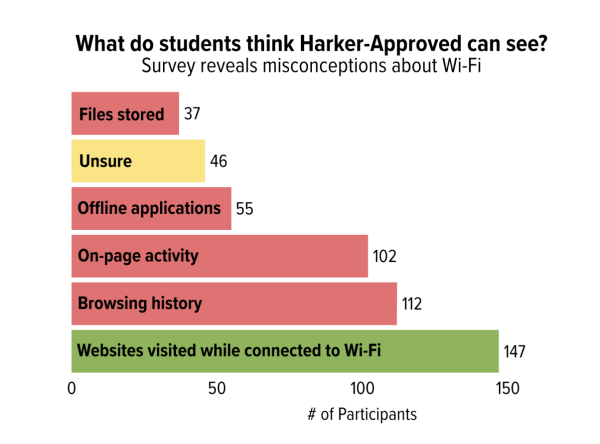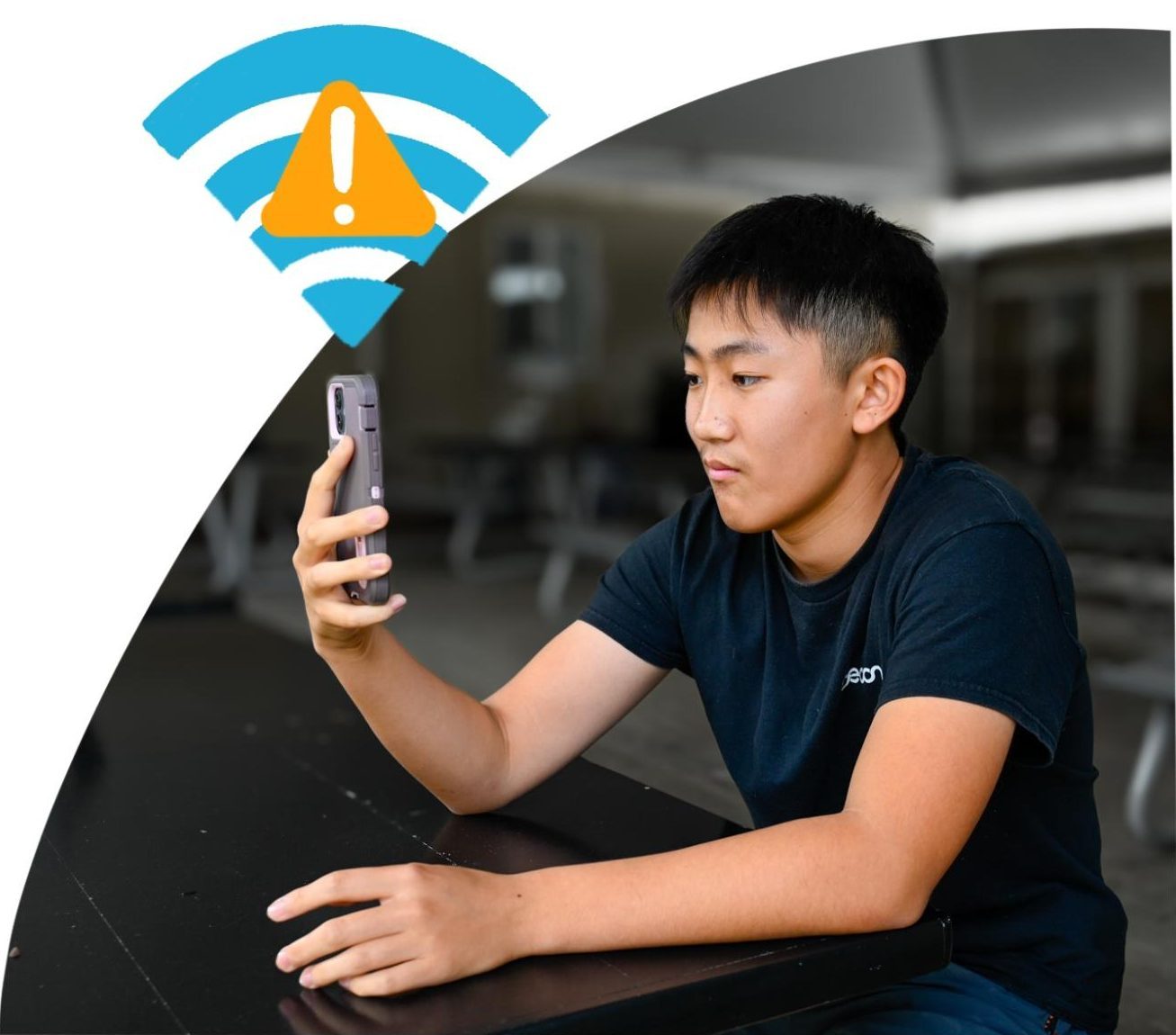Students across all 4 Harker campuses returned to find a new Wi-Fi system in place this fall: a single unified network, Harker-Approved. To connect, students were required to install a digital certificate, a piece of software that verifies a device belongs to a specific user.
While the overhaul was implemented to modernize infrastructure and improve cybersecurity, it also raised questions about privacy, with many students feeling unsure about what information the certificate could access. In a Schoology survey sent to upper school students with 163 respondents on Sept. 26, 61.7% reported being moderately to extremely concerned about their browsing being monitored. Only 8.6% are not concerned at all.
“When I first installed it, I heard some people saying things like, ‘It’s invasive, it’s root-level access,’” senior Laura Treves said. “I tried to figure out what it was and to learn more because I was worried about the security of it, like if some outsider could access my data. There was the feeling of, ‘What can it see? What can it track?’”
According to Information Technology staff, Harker has always had the ability to review internet logs, similar to how any internet service provider (ISP) can track user activity.
These logs record which websites are visited, at what time and from which IP addresses. The new certificate links each device to a specific user account and assigns it to the correct network — student, staff or guest — which makes it easier to confirm which user accessed a particular site if an investigation is required.

“It’s like the logging you have at home from your ISP — they know where you go online,” Director of IT Jesse Lara said. “If we were directed to, we could check who accessed a certain website at a specific time. Because of the certificate, it’s now easier for us to confirm with certainty, for example, that Dan went to YouTube at 11 o’clock. What he did on YouTube, though, we can’t see.”
Only Lara, Network Manager Dan Riemer and Riemer’s two team members can access logs, and they only do so upon direction by administrators, usually in connection with academic integrity investigations. The certificate does not give the school real-time monitoring ability or capture private content like typed text, files downloaded or videos watched.
“We are only looking at those logs if we are directed to do so,” Lara said. “I’ve been here 25 years. I think I’ve been asked twice over that course of time where they wanted to know who, when and where. Back then it was more difficult to do so. It’s easier to do now, but it also protects the student: If the student says they didn’t do it, and they really didn’t do it, this actually helps to prove that.”
Honor Council member Linda Zeng (12) explained that administrators turn to technical investigations only after receiving an incident referral and meeting with the student. If the student still denies wrongdoing, administrators might then request Wi-Fi logs.
“In general, they’re only looking up sensitive information like logs when they’ve gotten a report from either a teacher or a student,” Linda said. “Usually when it’s with a student, you need specific tangible evidence. Them actually checking the Wi-Fi logs is very rare and we almost never hear about it. It’s difficult to go to tech and get them all involved, and it’s also rare that students don’t admit to cheating in the first place.”
The push for modernization
This year’s Wi-Fi overhaul marked the completion of a long-term infrastructure upgrade. Beginning three years ago, Harker began replacing outdated wiring, network switches and access points across all campuses. The Union campus was the last to complete the hardware shift over the summer. With all campuses on the same equipment, IT could retire the patchwork of older networks like Harker-Summer and Harker-Staff and shift to a single, unified SSID.
“A lot of this stems from needing a more modernized hardware,” Lara said. “You’d be surprised to see the age of the hardware we used to run on, the speed of the network we used to run on, and still maintain it for almost 2,000 students and 700 or so faculty and staff members. It was really tough to keep it all up and running with the older hardware we had.”
According to Lara, the upgrade was also necessary to meet cyber insurance requirements. The previous networks did not satisfy the minimum security standards, making insurance coverage more expensive and limited. By aligning with current industry standards, Harker receives better rates, protection which Lara notes is critical, since a serious cybersecurity breach would be difficult for the school to absorb without an insurance policy.
Despite the hardware upgrade, many students do not perceive faster or more reliable service. 49.4% of survey respondents said the speed of the new network is worse than last year and only 12% report improvement. Before the transition to Harker-Approved, a majority already experienced issues at least once a month, problems that the rollout did not immediately resolve.
Alongside performance concerns, privacy remains the other dominant issue. More than 69% of students surveyed said they were unclear about what types of data the school can and cannot see. Many assumed administrators could track far more than IT staff described, with 63.7% believing that administrators can see on-page activity, 34.4% believing the school can see offline apps opened, and 23.1% believing that it can see files on the device.
“It’s a natural worry,” Laura Treves said. “There’s a lot of the ‘privacy is dead’ feeling with everything digital, so people will just see something that surveils and assume the worst because there are so many things out there which take that veil of, ‘Oh, this is for security,’ but then it’s more invasive than it presents itself to be. It’s a result of the world of what people are used to.”
The hotspot ban
A new rule in the student handbook this year banning personal hotspots compounded these concerns. Dean of Students Kevin Williamson cited two main reasons for the policy change: academic integrity and network performance.
Hotspots create what Williamson calls a “gray area” during assessments: When students switch to cellular connections, the school’s logs contain no trace of their online activity, making it harder to confirm whether cheating occurred.
“We have had instances of students using hotspots on the laptop during assessments to look things up,” Williamson said. “By using our own network, it would be protecting them in a sense because we could prove, if they were suspected of cheating, that they in fact were on the network and didn’t go to any outside sites. If we don’t see any network activity, we can’t prove or disprove if a student used a hotspot to get information. It leaves a big question mark.”
Junior Ian Lee sees the new hotspot rule as a response to the rise in academic integrity violations in the wake of AI tools like ChatGPT. However, he worries that the policy overreaches by treating all students as potential violators.
“I believe Harker is adding this hotspot rule and the internet log as a deterrent for academic dishonesty,” Ian said. “But I also feel like it is a bit harsh in that it penalizes all students, even though the majority of harder students are very academically honest. This was too drastic a measure to take, because you’re punishing the majority of Harker students for the bad actions of a few people.”
The new rule is also intended to address a network issue. According to Lara, hotspots broadcast on the same radio frequencies as Wi-Fi, creating disruptions that slow down connections.
“It causes problems with everybody’s Wi-Fi networks, and it becomes a cascading effect,” Lara said. “If you think, ‘Oh man, the network is so slow today, I’m just gonna pull my hotspot out because it’s so much faster,’ that causes interference for the other kids in the same room. And then if they also start pulling out hotspots, it becomes an even bigger problem and it grows.”
Still, the policy’s blanket nature has created practical concerns. Students point out that Wi-Fi outages do occur, and hotspots were often their fallback.
“I understand why they have it because hotspots go around the logging,” Laura said. “But it was annoying at the beginning because most people were not connected to the new Wi-Fi or had just disconnected. So there were times when some people in class just couldn’t access their homework or classwork.”
Head of Upper School Paul Barsky acknowledged the ambiguity, recognizing that the policy leaves ambiguity when outages occur.
“If our Wi-Fi goes down and someone goes on the hotspot, there’s no hotspot police,” Barsky said. “If our Wi-Fi is down, I go to my hotspot. I think administratively we need to look at that. I’ll make sure that we have clarity, because I know that kids want to do the right thing.”
Balancing security and transparency
That sense of uncertainty went beyond the new guidelines. Although IT posted instructions on Schoology before the school year began, many students were surprised by the requirement to install a certificate and the simultaneous hotspot ban. Nearly all respondents (94.5%) said they felt at least somewhat concerned about installing the certificate.
“On the first day of school, signing up was very hectic for a lot of my friends,” Ian said. “They were all struggling to get into the profile, myself included. Initially when I was trying to set it up, there was an issue with the fact that my computer seemed to think that the website that you signed up on was a virus, so I had to go change a few settings so I could access the profile creator and sign in properly.”
Ian’s experience echoed the majority of students surveyed, with two-thirds (67.3%) finding the process of transitioning their devices to Harker-Approved at least somewhat difficult. The technical errors, along with limited information about the purpose of the software and the hotspot restriction contributed to skepticism about the change. Barsky acknowledged that communication could have been clearer.
“If people feel that something wasn’t communicated, then there’s an opportunity to do a better job,” Barsky said. “Regarding the rolling out, things often happen during the summer, so it’s difficult sometimes to coordinate communication. In a school as large and as complicated as ours, it becomes a very important question. If kids feel like they didn’t know, there’s probably a reason, and then it was a missed opportunity.”
For Ian, the confusion points toward a need for greater transparency.
“It would be beneficial if students could request to see a log of whatever is tracked from Harker, so then they can see exactly what Harker tracks,” Ian said. “It would prove that it’s very transparent and students would know exactly what’s happening to their data. Also, I think that Harker should eventually repeal this measure if academic dishonesty cases decrease over time as a result of this.”
Lara and Riemer acknowledged that major changes often prompt resistance no matter how they are introduced.
“You always look back and think, ‘I could have done that differently, I could have done that better,’” Lara said. “A lot of times the concern on our end becomes the more information we tend to send out, the more questions and pushback we get about these changes. People fear change in general. I don’t like change, but sometimes change is necessary, and when we make those changes, we do try to get information out to everybody in a timely manner. You’ll always have the ability to then ask those questions and have follow-ups with us — we welcome it.”




